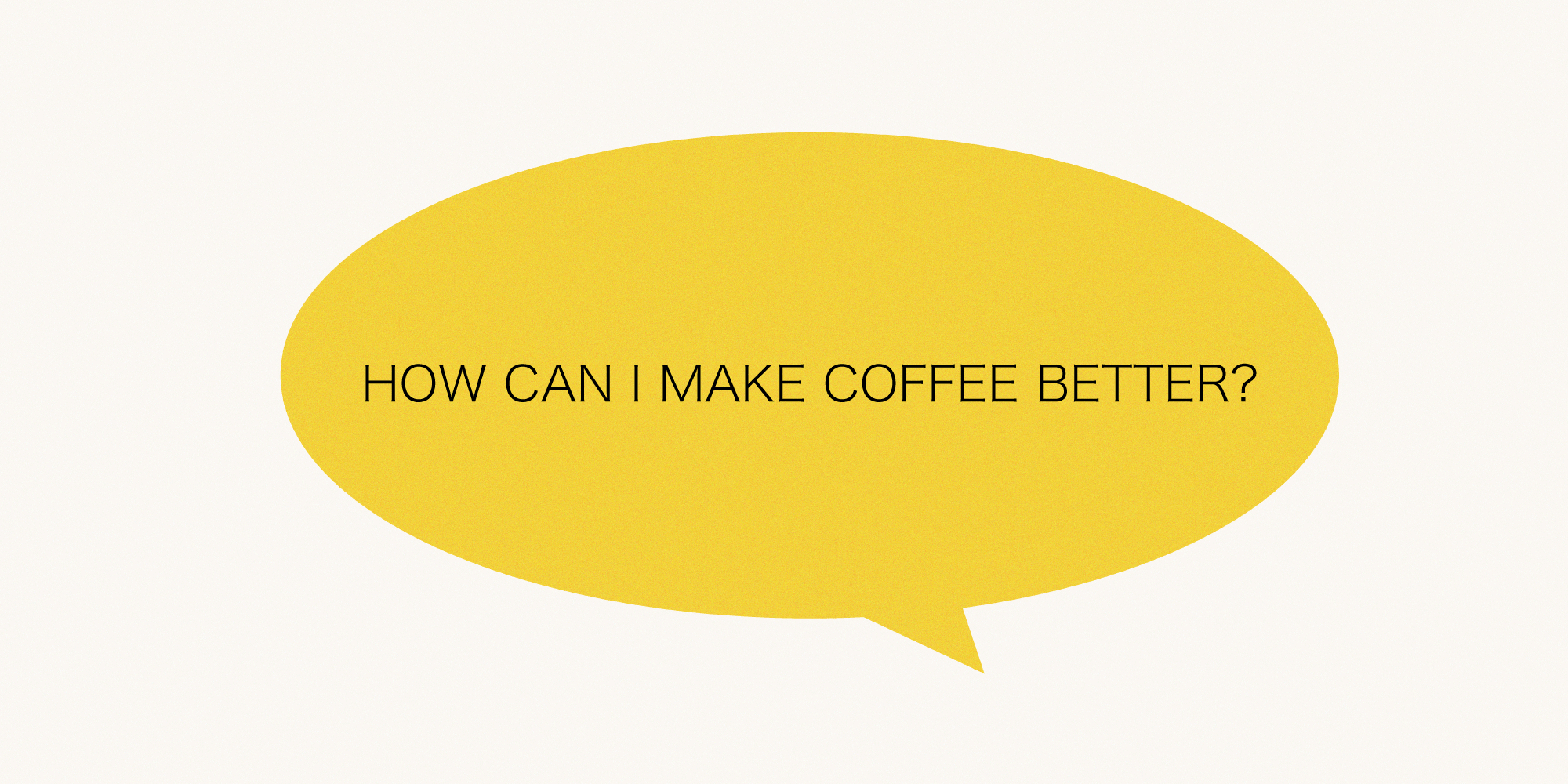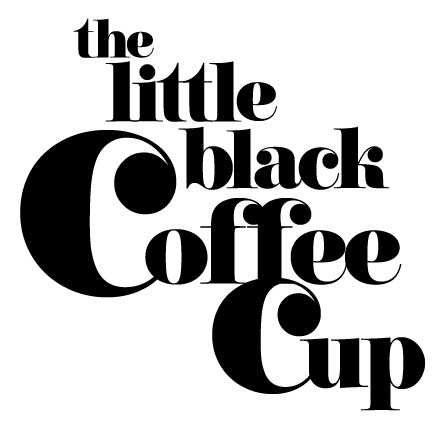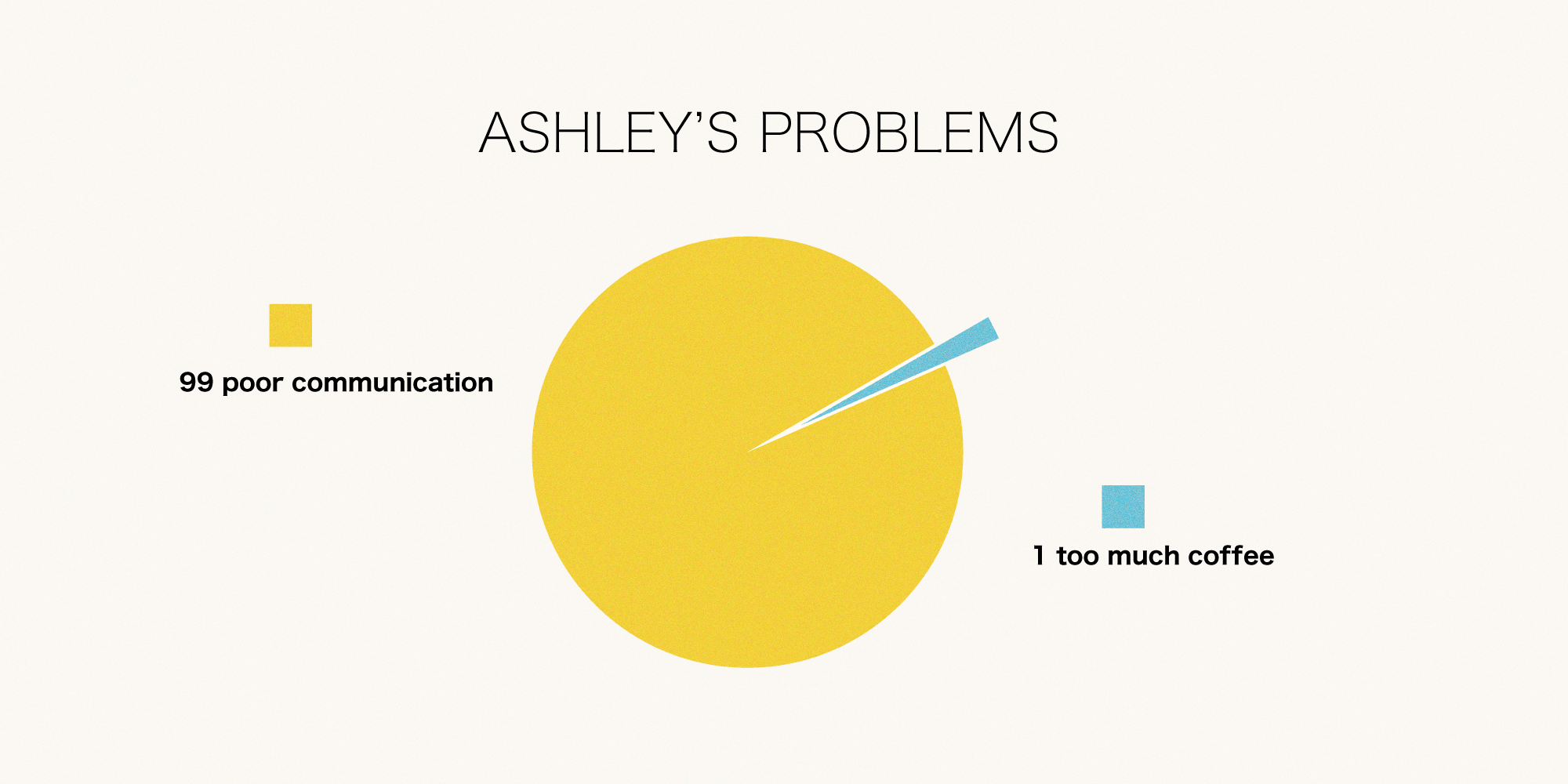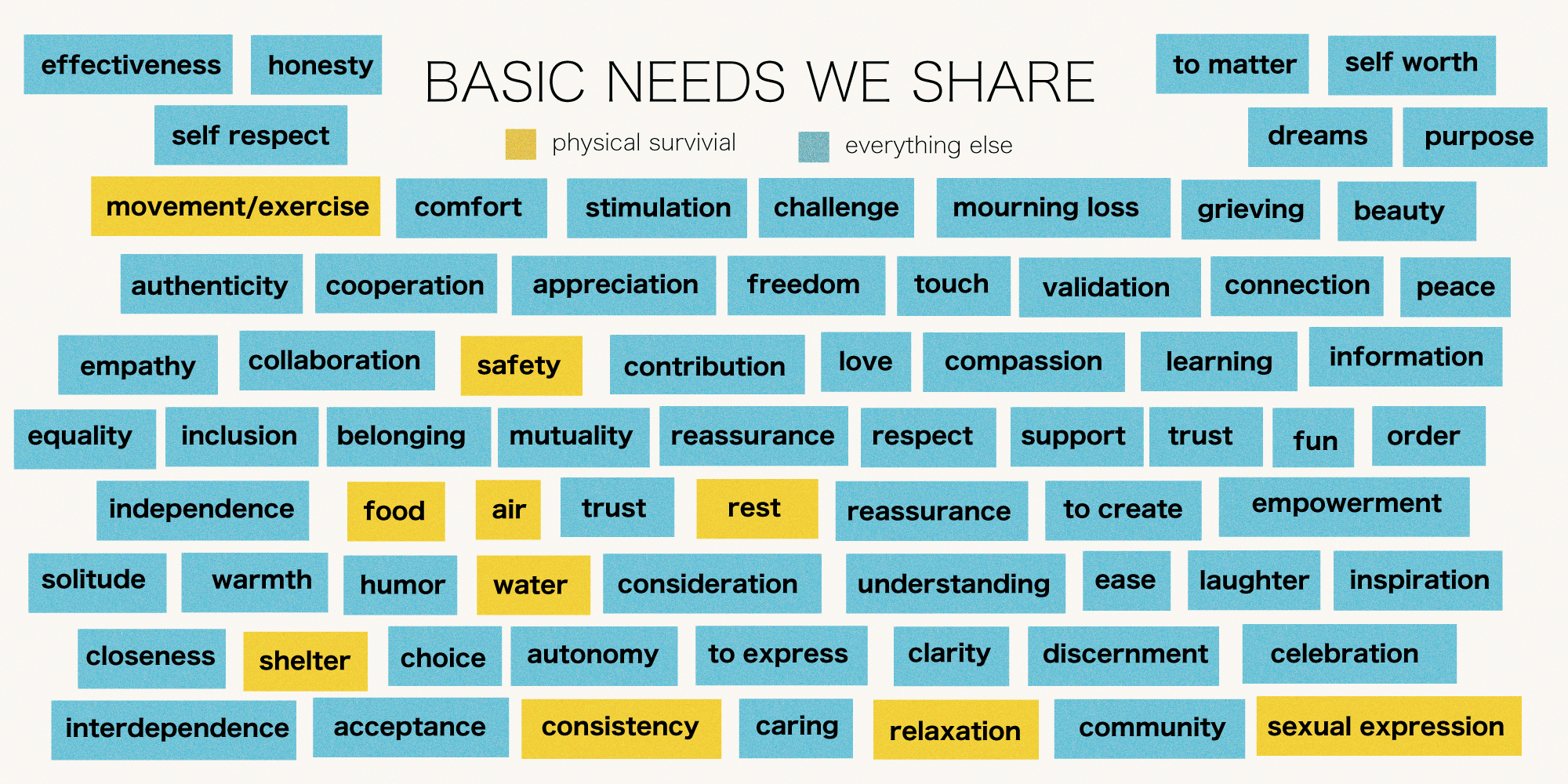How can I make coffee better? Perhaps add some Nonviolent Communication.

I’m an introspective type. I invest a lot of time and energy in self-improvement—I enjoy reading self help books, learning about nutrition and fitness, listening to a bajillion podcasts, and exploring all sorts of wellness practices: meditation, therapy, 12 step, yoga—you name it, I’ve probably explored it at least once. Over the summer I was listening to a podcast where the guest speaker introduced something called Nonviolent communication (NVC). While learning about the basic concepts of this communication style, it dawned on me that a very high percentage of the challenges, issues, and… err… “problems” in my life are likely the result of poor communication. See the highly scientific pie chart below:
And it’s ironic, isn’t it? The line of work I find myself in [coffee media and marketing] is 100% communication focused. And now, here I am now giving a presentation at East Coast Coffee Madness on how communication can "Make Coffee Better” and writing this article on the same topic. I’m inevitably going to say the ‘wrong thing’ at some point while I’m standing in front of the crowd, but I’ll chalk it up to the old adage that goes, “we teach what we need to learn.” So, my disclaimer for this article you’re about to read is: I’m new at this. I’m not an expert. However, I am super excited to share about NVC with you because if communicating is something I struggle with, perhaps it’s something you struggle with, too.
So, my theory goes something like this: Better Humans Make Coffee Better. And the second part of my theory is this, Humans become better when we are aware of how we are communicating with ourselves and each other. I will develop these ideas over the course of this article, but let’s keep it simple for now. I think many of the concepts introduced by Nonviolent Communication truly have the potential to make our personal lives, our businesses, and ultimately our coffee community better. Most of what you are about to read is adapted from Marshall Rosenberg’s book titled, Nonviolent Communication, A Language of Life, which I also highly recommend reading. You can also check out the Center for Nonviolent Communication online.
At this point you might be thinking, “ok great, whatever, I’m not a violent person, I don’t carry a gun, or get in [coffee] bar fights, I’m already compassionate!” This all might be true, however, if violence means, “acting in ways that cause hurt or harm” I don’t think any of us are 100% immune—we all likely have blind spots and have experienced instances where we have inadvertently hurt people, said something that caused someone else pain, or engaged in conflict.
Language that gets in the way
When developing an awareness about communication, I think a helpful place to start is to tune into words and ways of communicating that disconnect us from our compassionate nature. Below I’ve created some examples tailored to the coffee industry which have been adapted from the work of Henri Wai, a Toronto-based NVC teacher:
It’s important to note that within the context of this article about making coffee better, and also in this case of how to make humans better, there’s an inherent judgement that coffee is bad or we’re not good enough. So, I’d like to take a step back from that judgement, and suggest that the above examples of communicating I just presented are not bad or wrong, but as my Non Violent Communication teacher taught me, they are just “tragic expressions of our unmet needs”
I really enjoy the phrase, tragic expressions of unmet needs, because it gently informs us that we don’t speak or behave in these ways because we are inherently jerks or assholes (see: Label), but we communicate this way because we are unaware of what it is that we actually need in a given situation and how to ask for it.
So, What is Nonviolent Communication Then?
The basis for NVC assumes that it is in our nature as humans to enjoy giving and receiving in a compassionate manner. Marshall Rosenberg, the founder of NVC, dedicated his life to this premise and answering two questions: “What happens us to disconnect from our compassionate nature, leading us to behave violently? And conversely, what allows people to stay connected to their compassionate nature, even under the most trying circumstances?”
NVC is a method of communication that is designed to connect us with our innate capacity for compassion when relating to each other and ourselves. I believe that when we connect with this innate capacity we become BETTER! (or perhaps a more authentic version of ourselves). And, in turn, we can Make Coffee Better.
To be more compassionate we need to expand our consciousness and understand the places we are disconnecting from our compassionate selves and why. Rosenberg outlines a 4-step process that allows us to do this:
OBSERVATIONS: What are the actions that we observe that affect our wellbeing?
FEELINGS: How do we feel in relation to what we observe?
NEEDS: What are the needs, values and desires that create those feelings?
REQUESTS: What can we specifically ask for that help enrich our lives?
Observations
Observation is a key component in many mindfulness practices. Meditation asks us to be still and observe our breath or thoughts and feelings without passing judgement. NVC asks us to first play the role of the observer as well—can we observe a situation without evaluating it? In a nutshell, when our first response is to pass judgement on something or to evaluate it, other people receive our words as criticisms and are more likely to resist what we are saying.
For example, “You always act like your coffee is better than everyone elses’.” This is an evaluation.
The observation could be expressed as, “Last time I saw you, you told me that your Ethiopian coffee won a Good Food Award. When I hear you say that, I think you’re saying that your coffee is better than mine.”
Can you spot the difference? Let’s look at another example:
Evaluation: “John is a terrible green coffee buyer.” VS. Observation: “John hasn’t answered my last three emails about purchasing those experimental lots.”
Or how about:
Evaluation:“The cafe manager is aggressive.” VS. Observation: “The cafe manager yelled at me to clean the steam wand this morning. She was mad that I forgot clean it last night during close.”
From my perspective, evaluations lack nuance and take us farther away from the truth and/or our responsibility, and agency in a given situation. When we evaluate we limit our choices on how to resolve a situation. We also reduce the chances of getting our needs met (more on this later). If we start with observation we open a window to connect which also allows us the opportunity to take a closer look at our feelings.
Feelings
When a situation occurs, can you take a moment to tune into your feelings about it? Ask yourself, “ What am I feeling?” Often, we describe our feelings as judgements by saying, “I feel good about this” or “bad about that.” NVC teaches that there is a cornucopia of emotional states available to us: lonely, alarmed, confident, overwhelmed, delighted, nurtured, warm, puzzled, angry, energetic, groovy, amazed, satisfied, to name a few. Referring to our emotional state as good or bad is limiting language that lacks nuance and inhibits our ability to connect with each other. Being specific about what we are feeling allows us to express our vulnerability—which is also a tool for resolving conflicts.
When we say, “I feel like….” are we expressing how we feel or are we saying what we think we are?
In NVC, when “I feel…” is followed with “like, as if, I, you, he she, they, Susan, etc,” it’s a good indication that we are NOT expressing what we feel through our words. And sometimes, we even use the term I feel to express how we think others react to us. For example, saying "I feel” before words like misunderstood, unimportant, ignored, manipulated. provoked, unsupported—these are actually not our feelings but our interpretations of others. Eye opening stuff, don’t you think?
Needs
What are needs? Being needy gives needs a bad rep but, guess what friends, we all have needs. Needs are resources required for well being and conveniently we all share the same needs—they’re universal—you can think of them as a pre-requisite for being human. They are also non-specific, which means needs are not attached to a particular person, place, or thing. So, we can all just take a deep breath, calm down, give ourselves and each other a break for having needs, and go forth in the world with the new found privilege and responsibilty of meeting our needs in a healthy way. Here are some examples of needs we share based on work by Henry Wai:
Women in Coffee + Needs
This may sound ridiculous, but for me personally, the fact that I have all of the above needs—the same as everyone else— was a huge blind spot, especially beyond the needs required for physical survival. I see awareness of this as the first step to empowering myself as a woman [and as a woman in the coffee industry]. Rosenberg gives great context as to why someone like me [see: a woman] might have a hard time acknowledging my own needs in his book, “In a world where we’re often judged for identifying and revealing our needs, doing so can be very frightening. Women, in particular, are susceptible to criticism. For centuries, the image of the loving woman has been associated with sacrifice and the denial of one’s own needs to take care of others. Because women are socialized to view care taking of others as their highest duty they often ignore their own needs.” As you can see, it’s always important to understand the context we find ourselves so we can offer ourselves forgiveness for the lack of knowing what our own needs are. Moving forward with an increased consciousness of our needs allows us to identify them and learn how to take concrete steps to improve our situation (see: requests). Rosenberg goes on to say, “If we don’t value our needs, other’s may not either.” Of course, this statement is relevant for all of us, not just women.
Becoming cognizant of our own needs, allows us to become aware, receptive and empathetic to others needs as well. It’s a win win.
Emotional Liberation
Feelings and needs are often very closely intertwined. Before we move on to how to get our needs met, I’d like to share an illustration I made of Rosenberg’s steps to Emotional Liberation. I find this stuff super enlightening. One of my favorite teachings in NVC is that we can never get our needs met at the expense of others. Perhaps this is relevant to the coffee industry when we’re looking at issues like barista wages and the coffee price crisis.
Requests
How do we ask directly and concretely for what we need? How can we request that which would enrich our lives? It is Roseberg’s belief that whenever we speak to another person, we are requesting something in return. When we are clear about what we want, for example: to be heard, some empathy, to be understood, or a concrete action to be taken—the more likely it is that our request will be received and our needs can be met by the other person.
The End of this article… but perhaps it’s also the beginning of something else….
In conclusion, there’s a lot that has been left unsaid about Nonviolent Communication in this post. NVC is a gentle, nuanced, conscious, and intentional tool designed to connect us with ourselves and each other. It has been used to better intimate relationships, familial relationships, schools, organizations, business and diplomatic negotiations, and conflicts of all kinds. And finally, I’d like to make a request from all of you in the coffee industry reading this… Can you ask yourself….
Resources:
Marshall Rosenberg’s book: Nonviolent Communication, A Language of Life
THE CNVC website: Center for Nonviolent Communication.
Say What You Mean, book by Oren Jay Sofer
Interested in taking NVC trainings in Toronto? Connect with Henri Wai





















